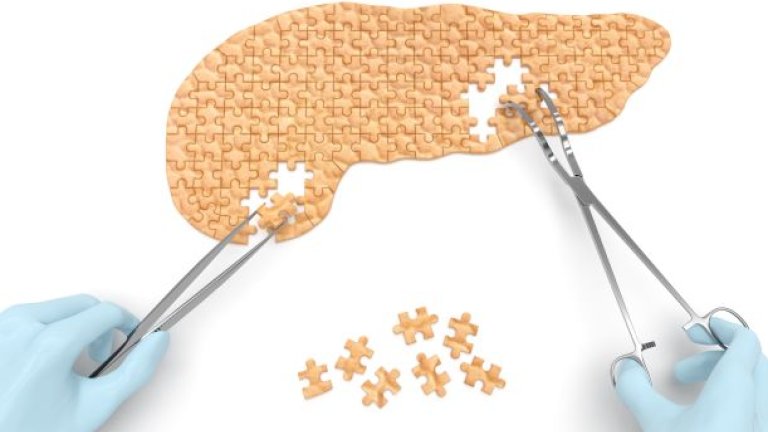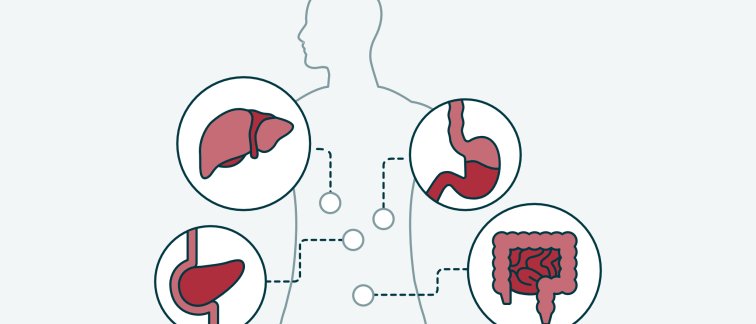This program consists of very well-cooperating translational research groups that work together in many successful consortia, with ample international collaborations. The groups conduct research in all age categories and covering the whole gastrointestinal tract, with a strong portfolio of collaborative studies with pharma, food and med tech companies.
For example, due to the strong collaboration between the clinical groups and the groups of the Tytgat Institute for Liver and Intestinal Research, who provide a solid basic research component, clinical questions can be answered quickly in the laboratory setting, thereby ensuring rapid application of knowledge in the clinic.
Upper gastro-intestinal tract
Barrett’s esophagus, esophageal cancer, gastric cancer
In Barrett’s esophagus, intestinal mucosa develops in the esophagus. By integrating expert histopathology images assessment with Artificial Intelligence (AI) and biomarker analysis, objective diagnosis and patient tailored risk stratification becomes possible in this. This is important, as this condition is a precursor of esophageal cancer. Continuous improvement of the treatment of neoplasia and advanced esophageal tumors is also of vital importance. Currently, the watchful waiting strategy is thought to be a safe and viable alternative to surgery in in patients with high-risk esophageal adenocarcinoma.
Also in other upper-GI cancers more and more minimally invasive techniques are gradually being implemented worldwide and therefore developed, tested an improved at the Amsterdam UMC. The Amsterdam UMC is currently one of the largest centers for esophageal and gastric cancer in Europe. A large biobank has also been set up for esophagogastric and pancreatic cancer, including plasma and serum samples, tumor tissue for multi-omics analyses and patient derived xenografts and organoids.
Neurogastroenterology, motility and benign esophageal disorders
New insights into the connection between the nervous system and the digestive tract come up every year, making neurogastroenterology an active and important topic. Esophageal motility can be affected in many different diseases or disorders, e.g. in achalasia, where the wall of the esophagus is constantly tensed up. Or in eosinophilic esophagitis, which is caused by an allergy, the esophagus is unable to contract properly. This causes a variety of uncomfortable symptoms that can even be detrimental in children.
PIs involved in this program
- Mark van Berge Henegouwen, Pure profile
- Suzanne Gisbertz, Pure profile
- Hanneke van Laarhoven, Pure profile
- Donald van der Peet, Pure profile
- Sybren Meijer, Pure profile
- Jacques Bergman, Pure profile
- Arjan Bredenoord, Pure profile
Small intestine and colon
Inflammatory Bowel Disease
Inflammatory Bowel Disease (IBD) is a collective name for several chronic autoimmune-related inflammatory diseases, including the two mayor types: Crohn's disease and ulcerative colitis. Each year, roughly 5000 patients come in at IBD clinics of the Amsterdam UMC. To tackle the current challenges, a strong collaboration of laboratory, the clinic, and the departments of radiology, pharmacology, and pediatrics has been set up. Specific focus is given to drug development (Including phase 2/3 trials and drug rediscovery projects), optimizing current treatment and diagnostic/follow-up strategies (including biomarker development and ultrasonography), complications of IBD (like fistulas) and translational research projects with the Tytgat laboratory,
Small intestinal inflammatory diseases & nutrition
The small intestine can also get inflamed as a result of nutrition. Celiac disease is a common example. It is estimated that up to 1% of Dutch people is affected by celiac disease and get an inflammatory reaction in the intestines after eating gluten. This reaction can damage the small intestine, making research into possible new treatments important. With small intestinal diseases, such as intestinal failure, there is a central role for diet and nutrition, emphasizing the importance of research into the effect of nutrients and nutritional interventions. AGEM researchers are also involved in Global Child Health, which concerns topics such as childhood malnutrition and the link between nutritional status and acute illness.
Necrotizing enterocolitis
Necrotizing enterocolitis (NEC) is one of the most frequent gastrointestinal diseases in the neonatal intensive care unit, with high mortality and morbidity rates. Up to 20% to 40% of infants with NEC will need surgical intervention at some point. Current research at the Amsterdam UMC focuses on the pathogenesis, early diagnosis, and treatment of NEC with a focus on the role of microbiota and its metabolome in the development of NEC. Accurate diagnosis of NEC and selection of appropriate therapy are essential, marking the importance of continued research into clinical prediction models and biomarkers.
Pediatric abdominal surgery (Kinderbuikcentrum)
At the Amsterdam Pediatric Abdominal Center, children from all over the Netherlands can visit a multidisciplinary team of experts with disorders of the gastrointestinal tract, urinary tract and other abdominal organs. Clinical research is primarily aimed at improving the outcome and quality of care for children with complex abdominal disorders, with large international centers being the benchmark. Research is also being conducted into the prevention of diseases and complications.
Additional research topics
Obstipation
Obstipation can have many causes, both mental and physical, and many negative consequences, both temporary and chronic. Especially in children it is a common phenomenon. Research into the causes and potential treatments of childhood obstipation are of ongoing importance and within the Amsterdam UMC, led by AGEM researcher Marc Benninga.
Intestinal failure surgery
AGEM researcher Marja Boermeester is focused on clinical and preclinical aspects of abdominal infections and intestinal failure. An important part of this is surgery of abdominal catastrophes, emergency surgery, intestinal failure surgery, and complex abdominal wall reconstruction; in other words, the most complex and urgent cases.
PIs involved in this program
- Nanne de Boer, Pure profile
- Geert D’Haens, Pure profile
- Christianne Buskens, Pure profile
- Krisztina Gecse, Pure profile
- Tim de Meij, Pure profile
- Johan van Limbergen, Pure profile
- Mark Lowenberg, Pure profile
- Jaap Stoker, Pure profile
- Anje te Velde, Pure profile
- Manon Wildenberg, Pure profile
- Wouter de Jonge, Pure profile
- Saskia Cillessen, Pure profile
- Merit Tabbers, Pure profile
- Wieger Voskuijl, Pure profile
- Joep Derikx, Pure profile
- Hans van Goudoever, Pure profile
- Ramon Gorter, Pure profile
- Marc Benninga, Pure profile
- Marja Boermeester, Pure profile

Pancreas, biliary tract and liver
Hepato-Pancreato-Biliary diseases
Another focus of AGEM researchers is improving the outcome for patients with pancreatic and hepatobiliary diseases. This includes new treatment options for locally advanced pancreatic cancer and other ways to execute surgery, such as robotic and laparoscopic pancreas surgery. On top of that, they focus on improving the clinical management of acute and chronic pancreatitis and improving the prevention and treatment of pancreatic and biliary complications of bariatric surgery.
Cholestatic/Immune-mediated liver disorders (PSC, PBC, AIH)
Bile acids play a key role in digestive functions and are also major determinants of the composition of the microbiome. Diseases of the liver and biliary tree that interfere with appropriate bile flow cause cholestasis which causes significant morbidity including pruritus (itch), extreme fatigue, jaundice and elevated cancer risk.
The basic liver research performed at the Tytgat Institute focusses on bile acid, lipid and cholesterol homeostasis and encompasses biochemical or cellular investigations as well as physiological studies using animal models. A strong link with clinical research exists and several examples exist of basic research finding being translated to the clinic. One of the focus areas is on inherited forms of cholestasis and jaundice.
MASLD/Lipid metabolism
See the Metabolism research program for more information on this topic.
Liver cysts
AGEM researcher Joost Drenth has an interest in polycystic liver disease and developed tools and options to better manage the disease such as novel treatment paradigms, development of a validated questionnaire and tools such as automated liver volumetry to evaluate the efficacy of treatment strategies. He initiated rigorous clinical trials in polycystic liver disease, this opened up the road for novel treatment options for patients living with a rare disease.
PIs involved in this program
- Marc Besselink, Pure profile
- Hanneke van Laarhoven, Pure profile
- Rogier Voermans, Pure profile
- Rutger-Jan Swijnenburg, Pure profile
- Piter Bosma, Pure profile
- Stan van de Graaf, Pure profile
- Cyriel Ponsioen, Pure profile
- Onno Holleboom, Pure profile
- Bart Koot, Pure profile
- Joost Drenth, Pure profile

Pre-malignant screening
With pre-malignant screening, diseases such as cancer can be detected early on and thus can be combatted more effectively. Examples of screening are endoscopic detection and biomarkers, both utilized by Jacques Bergman. Evelien Dekker’s research group focuses on colorectal cancer screening and surveillance, both in average risk and high-risk populations (e.g. hereditary polyposis and cancer syndrome patients). In the field of Barrett’s esophagus-related neoplasia and low-risk cancer, Roos Pouw developed a prediction model to identify patients with an increased risk of recurrence during follow-up, who may benefit from more stringent surveillance.
Colorectal dysplasia & cancer
Colorectal cancer develops from precursor lesions, like adenoma or sessile serrated lesions of the colon. Early detection and removal by endoscopy of these neoplastic lesions is crucial, as this leads to lower rates of cancer. The focus of this part of AGEM research is the discovery and implementation (for example within the national screening program) of non-invasive biomarkers for accurate detection but also on optimizing the endoscopic procedures and techniques for removal.
PIs involved in this program
- Evelien Dekker, Pure profile
- Nanne de Boer, Pure profile
- Jacques Bergman, Pure profile

